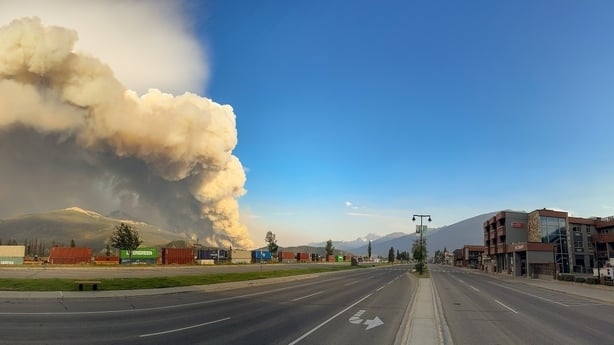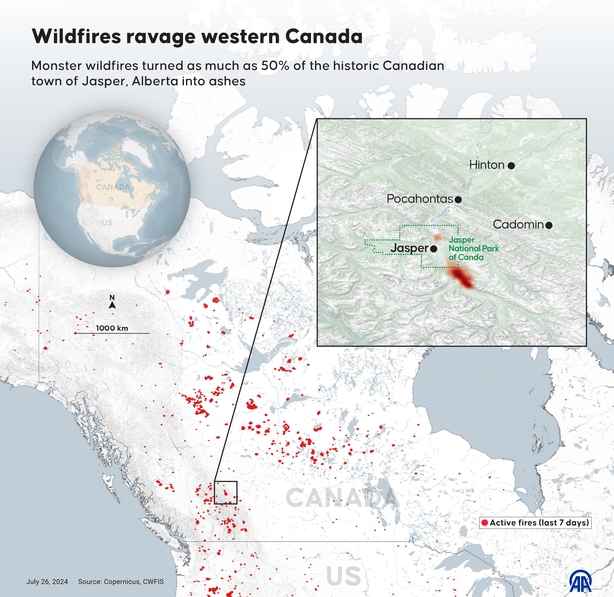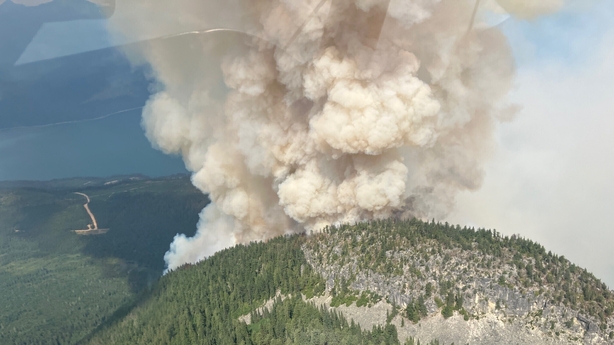Steady rain is likely to help firefighters working to contain a massive wildfire that has devastated parts of the western Canadian tourist town of Jasper, authorities said.
Jasper is in the middle of mountainous Jasper National Parkin the province of Alberta. A huge fast-moving fire has damaged or destroyed up to half the town's structures.
Parks Canada said between 10mm and 15mm of rain had fallen yesterday. "This precipitation will likely keep fire behaviour low for the next 72 hours," it said in a statement.
"Crews will take advantage of this time to make as much progress as possible to suppress the wildfire and reduce further spread. While rain in Jasper is a welcome sight, warm weather is forecast and will increase wildfire activity."
Authorities have so far declined to give specific details of how many buildings were lost in Jasper, which normally has a population of around 5,000. Video posted to social media showed entire blocks had been burned to the ground.
Alberta Premier holds back tears while reporting wildfire
The town and park, which draw more than 2 million tourists a year to this area of the Rocky Mountains, were evacuated on Monday, when officials estimated there were up to 10,000 people in the town and a further 15,000 visitors in the park.

Late yesterday, authorities said crews had managed to protect all of Jasper's critical infrastructure. This included the hospital, schools and a wastewater treatment plant.
The Jasper Park Lodge, one of the largest hotels in town, said it had suffered some damage but most structures remained standing and intact.
The 400-room residence is run by Fairmont, a group owned by France's Accor.
The Trans Mountain oil pipeline, which can carry 890,000 barrels per day (bpd) of oil from Edmonton to Vancouver, runs through the park. The operator said yesterday there were no signs of damage.
The federal government said in April that high temperatures and tinder-dry forests meant this could be a catastrophic year for wildfires in Canada.
The current fire could be one of the most damaging in Alberta since a 2016 blaze that hit the oil town of Fort McMurray, forcing the evacuation of all 90,000 residents and destroying 10% of all structures there.

Jasper resident Eva Korduliakova heard the news that her home was burning from thousands of kilometres away yesterday morning, while visiting family in the Czech Republic with her seven-year-old son.
"I am a single mum who became homeless and jobless overnight," she wrote in an email.
"Our house is gone. I didn't get a chance to grab any of my belongings," she added.
Jasper Mayor Richard Ireland said the town was beginning to come to terms with "the devastating impact" of the fire.
"Last night's wildfires have simply ravaged our small tight-knit mountain community, the destruction and the loss that so many of our residents are facing simply defies description," he told a press conference.
CN Rail said it suspended rail operations through the town on Wednesday afternoon as the wildfire conditions worsened.
The Port of Vancouver, Canada's largest, said it expected to see delays to the movement of goods through the port in the coming days due to the events in Jasper.
The federal government and other cities in Alberta are sending emergency crews.
In addition, a total of 400 firefighters from Mexico, South Africa, Australia and New Zealand are due to arrive in the coming days.
'Wall of flames'

There are currently 176 wildfires burning in Alberta, more than 50 of which are out of control.
Around ten of those blazes are close to the border with British Columbia, where there are 423 wildfires burning and dozens of evacuation orders and alerts.
Prime Minister Justin Trudeau said yesterday that he had convened a meeting of the Incident Response Group to discuss the Alberta wildfires.
"Every federal agency is coordinated, sending resources to Jasper, deploying evacuations support to the area and reinforcing firefighting efforts on the ground," Mr Trudeau said in a post on X.
The federal government said in April that high temperatures and tinder-dry forests meant this could be a catastrophic year for wildfires in Canada.
The Jasper fire was caused by a lightning strike on Monday afternoon and fuelled by strong winds, according to Parks Canada.
Flames from the blaze rose 100 metres high and strong wind gusts on Wednesday afternoon pushed the fire 5km in less than 30 minutes, Alberta Public Safety and Emergency Services Minister Mike Ellis said.
"Any firefighter will tell you there's little to nothing you can do when you have a wall of flames coming at you like that," Mr Ellis said.

